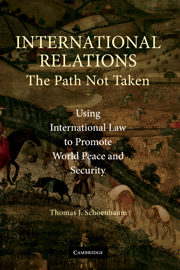Book contents
- Frontmatter
- Contents
- Preface and Overview
- 1 Introduction: Two Very Different Wars in Iraq
- 2 The Twenty-First Century – The End of History or a New Beginning?
- 3 International Power Politics
- 4 A New Global Order Based on International Law and Multilateralism
- 5 Peace and Security: Reinventing the United Nations
- 6 International Political Economy
- 7 International Environmental Protection
- 8 International Human Rights
- 9 International Crimes
- 10 Conclusions
- Index
- References
6 - International Political Economy
Published online by Cambridge University Press: 23 July 2009
- Frontmatter
- Contents
- Preface and Overview
- 1 Introduction: Two Very Different Wars in Iraq
- 2 The Twenty-First Century – The End of History or a New Beginning?
- 3 International Power Politics
- 4 A New Global Order Based on International Law and Multilateralism
- 5 Peace and Security: Reinventing the United Nations
- 6 International Political Economy
- 7 International Environmental Protection
- 8 International Human Rights
- 9 International Crimes
- 10 Conclusions
- Index
- References
Summary
A MULTI-BILLION DOLLAR DILEMMA
In the spring of 2005 Masatsugu Asakawa, a top official of the Japanese Ministry of Finance, was not sleeping very well, and we can all sympathize with his plight. Mr. Asakawa is in charge of managing the portfolio of U.S. government securities held by the government of Japan – which totaled $720 billion at the end of 2004. A lot of money, you might say, but consider this: From 2002 to 2005 the value of the U.S. dollar fell 24 percent against the Japanese yen. And Mr. Asakawa's sleep problems were exacerbated by the fact that, when he goes to sleep each night, a wireless monitoring device at his bedside beeps whenever the U.S. dollar drops below a set range. “This thing wakes me up, it's terrible,” he says. “Fortunately my wife is very understanding.”
What should Mr. Asakawa do? Because of Japan's trade surpluses with the United States, the dollars keep rolling in, but the value of the dollar may keep falling. If Mr. Asakawa pares back his dollar holdings, it will only cause the dollar to fall even more, perhaps to a dangerously low level. So at least for the time being, he will continue to buy dollar-denominated assets, even in the face of a declining dollar.
Japan's dilemma is typical of those faced by governments and companies around the world. American economic policy changed drastically beginning in 2001.
- Type
- Chapter
- Information
- International RelationsThe Path Not Taken, pp. 148 - 195Publisher: Cambridge University PressPrint publication year: 2006

